Facebook, Amazon, Google, and Apple provide great services — but do they have too much power?
Recently, both Ted Cruz and Elizabeth Warren called for big tech companies to be broken up. They sit pretty much on opposite ends of the political spectrum — the fact that they agree on this issue is very telling.
The big tech companies make useful products, and they’ve changed the way we live our lives. But their influence is staggering — the Cambridge Analytica scandal is a good example of this. The fear is that these companies will become monopolies.
America’s antitrust law states that if you become a monopoly from providing high-quality products to consumers for a low price, it’s totally fine. Because it’s based on merits, not on being sneaky and unfair.
☝️ But wait, that antitrust law is based, very heavily, on this Sherman Antitrust Act, which is from 1890 — back when dynasties were built on things like the rail road and oil, which is stuff that consumers have to pay for. In our pixel-laden digital age, things like Facebook and Google are completely free.
Does this mean the law doesn’t apply?
Antitrust laws do apply to big tech — they just need updating.
The antitrust law says that products that a company produces should be good, and at low cost to the consumer. When it comes to big tech, the term ‘cost to consumer’ really needs to be redefined, and the law needs an update.
Big tech avoid penalties because the law doesn’t seem to cover the hijacking of private experiences as a cost — but this is exactly what eats away at our autonomy and control of our privacy.
Big tech avoid penalties because the law doesn't seem to cover the hijacking of private experiences as a cost
Furthermore, when these companies are finally penalised, nothing changes. Facebook’s recent $5bn fine from the FTC was a win for both sides — the FTC now looks like they are doing their job, and Facebook can say they learnt their lesson. $5bn is a drop in the ocean for Facebook.
Think about it: if a cinema ticket cost £100, and the fine for pirating a movie was 20p, you would most likely break the law, because it’s far more affordable.
Big tech companies have thrived in this environment; when a product is free, the user becomes the product: users happily trade aspects of privacy for a bit of extra convenience. That is the true cost of these products.
Let’s have a look at what those costs mean…
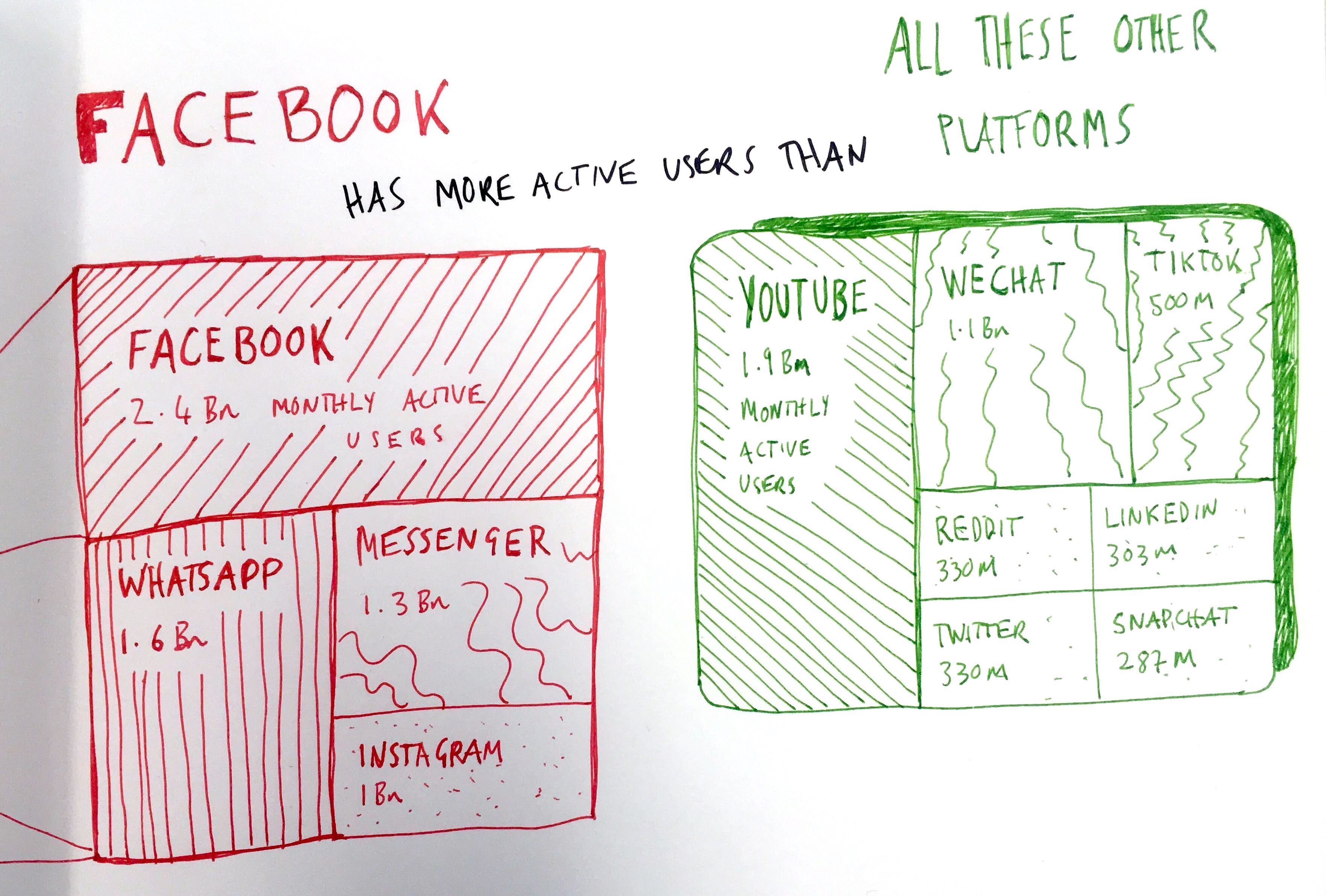 Facebook’s dominance over other similar platforms
Facebook’s dominance over other similar platforms
Facebook is an ad network first and a social media platform second. They provide free social media platforms for people to use, and these platforms are designed to learn everything about you. Their paid services — advertising — are extremely effective purely because of the free, social media side.
This of course goes beyond just peddling behavioural ads; their global reach has the power to inform our opinions. This video of Nancy Pelosi (the most powerful democrat in the USA) is edited to make her look drunk — if you already weren’t a fan of her, seeing this obviously wouldn’t help. If you weren’t sure about her, you probably are now. She does not come off well.
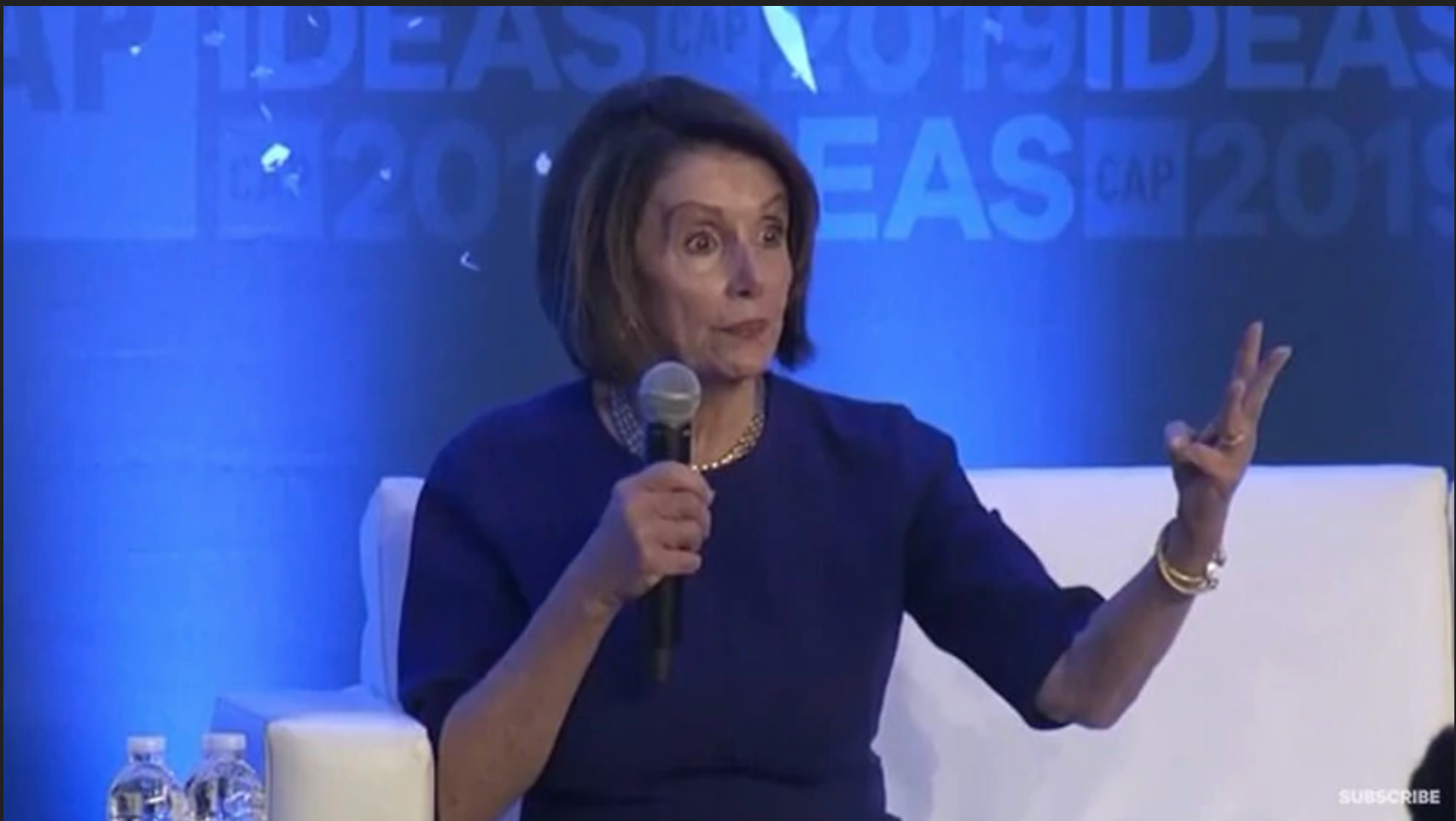 The technology used to make this video was nothing sophisticated — just a matter of slowing down the audio while maintaining pitch.
The technology used to make this video was nothing sophisticated — just a matter of slowing down the audio while maintaining pitch.
The video is of course fake — news reports describing this viral video explained that the audio was slowed down to make Pelosi’s speech sound slurred. Facebook refused to take it down, and the video continues to rack up views. Facebook has no obligation to make clear to it’s user’s that this video is fake, which means that newsrooms around the world who only have national reach are held to a higher standard than a platform with 2.4bn active users worldwide.
Newsrooms around the world who only have national reach are held to a higher standard than Facebook, a platform with 2.4bn active users worldwide.
☝️ Important note about all of this: Mark Zuckerberg still has majority share of Facebook, and therefore has full control. Considering Facebook’s ability to influence behaviour and opinion on a global scale, that’s a lot of power for just one person to have. Chris Hughs, a co-founder of Facebook, agrees this is too much in his article calling for a break-up:
Mark’s influence is staggering, far beyond that of anyone else in the private sector or in government. […] Mark alone can decide how to configure Facebook’s algorithms to determine what people see in their News Feeds, what privacy settings they can use and even which messages get delivered. Chris Hughs, New York Times
So Facebook, via their free products, control what we see and can use their paid products to change our behaviours and opinions. One of the hidden costs behind the free products is true autonomy. Mark Zuckerberg has ultimate control over this, and unlike other powerful world leaders, he cannot be voted out office.
What would breaking up Facebook look like?
WhatsApp and Instagram are both part of Facebook — that means the Facebook advertising machine has access to some amount of data produced by the users of those two platforms. Whether or not the data is anonymous, Facebook have the resources and computational power to build ad profiles from this.
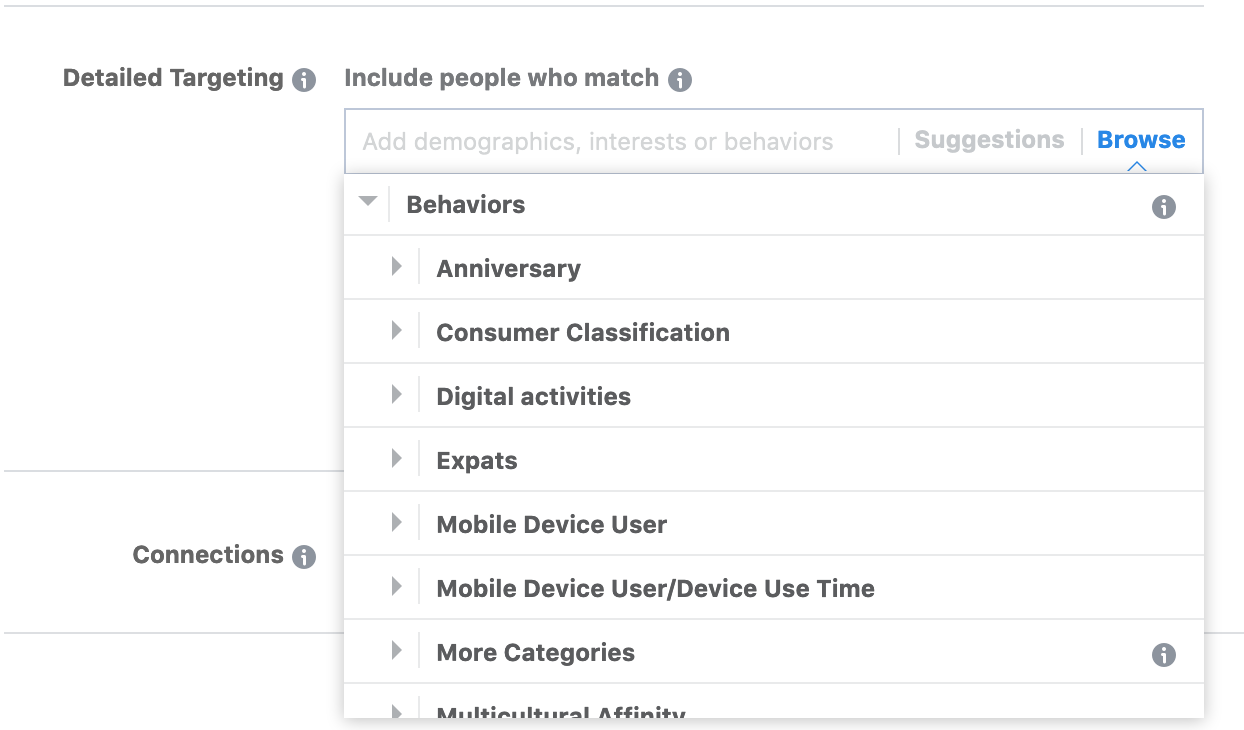 A drop-down menu from Facebook’s granular advertising tools
A drop-down menu from Facebook’s granular advertising tools
⛏ An obvious first step to breaking up Facebook would be to make WhatsApp and Instagram separate companies, as they were before. For Facebook, less users = less power and influence.
As time goes on, the potential to do this will narrow; in Mark Zuckerberg’s privacy-focused blog post in March, he talked a lot about interoperability, which is the idea that the three apps should become very closely linked with each other. E.g. sending messages via WhatsApp to friends on Instagram.
😬 Arguments against breaking up Facebook span from the sheer size of Facebook itself — few other companies have the resources and money to spend on new technology that Facebook has. And they are in charge of a lot of user data. Some argue that breaking all of that data up, and pulling it away from sophisticated systems could cause security issues.
Take a moment and think about how easy it would be for you to never use another Google product ever again. Okay, so you use Yahoo instead of Gmail, you don’t have a Google phone and you obviously don’t use Google Analytics because you don’t run a website. But which search engine do you use?
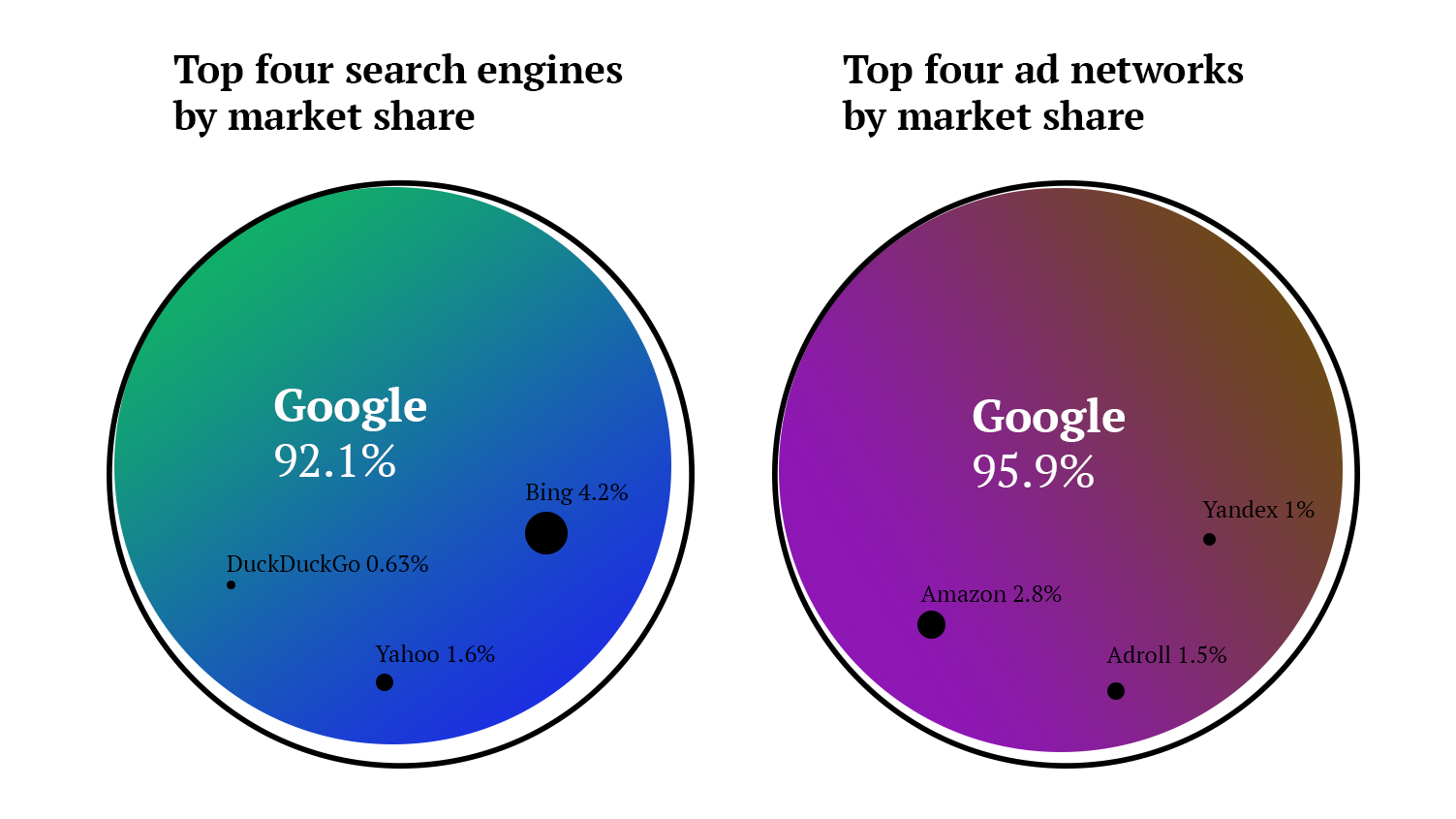 Google very much dominates both the ad network market and the search engine market.
Google very much dominates both the ad network market and the search engine market.
Even if you’re within that 8% of the market that uses Bing, you can’t actually avoid Google. Google’s advertising, tracking, and analytics technologies are present on many popular websites. We found that among the top 500 most visited websites, 67% of them drop cookies relating to Google before getting active user consent.
So you can actively avoid Google products such as Gmail and Google Drive, but they will still, on some level, have insight to what kind of person you are — enough to advertise to you effectively, and to give you highly personalised recommendations while browsing Youtube.
When watching Youtube, the line between actual human choice and machine recommendation is heavily blurred.
So again, the cost to the consumer here is autonomy and privacy — when deciding what to watch next on Youtube, the line between actual human choice and machine recommendation is heavily blurred. The same goes for things like maps; your location and everyday behaviours do a lot to help Google show you drop pins of places ‘you might like’.
What would breaking up Google look like?
Like Facebook, Google thrive in ad tech — their job is to know you. If you have a Google account, have a look at adsettings.google.com to see what I mean.
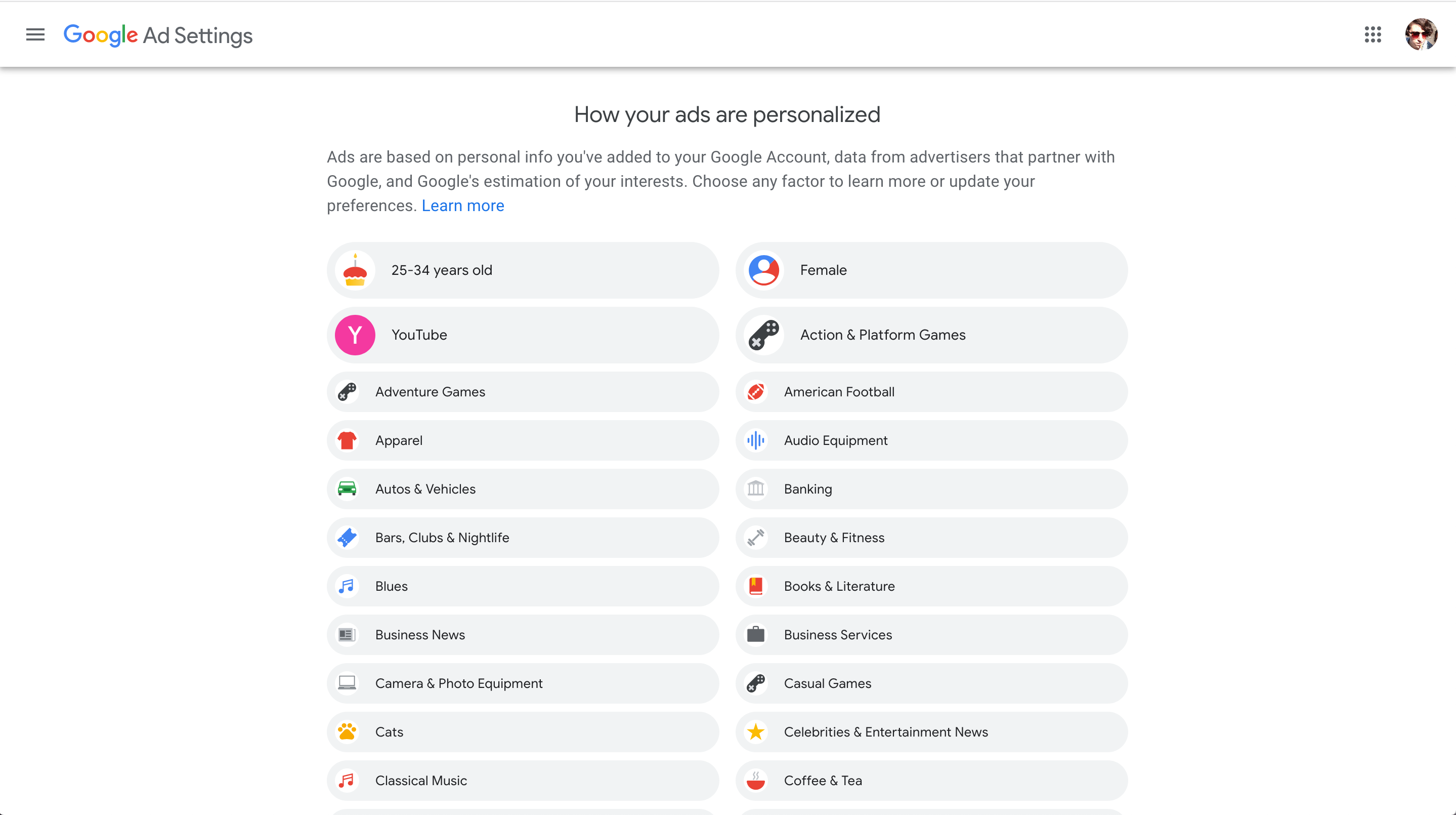 So apparently I’m into ‘women’s interests’ and ‘shooter games’
So apparently I’m into ‘women’s interests’ and ‘shooter games’
This knowledge, of course, makes all their products better — especially things like Youtube. But, like I said, you don’t need to have a Google account for them to know you; not having an account just means you won’t be able to access those ad settings shown above.
⛏ Some ideas on how to break Google up: cut Youtube loose, and even other products that are far removed from search engine things, like Google Drive (and Docs and Sheets etc).
Google are also a perfect example of why we need tighter regulations on advertising technologies; destructive advertising methods such as real-time bidding are intrusive, and currently not GDPR compliant by any measure. Real-time bidding is an online advertising methodology, which broadcasts intimate personal details such as religious beliefs to hundreds of advertisers at once, in the time it takes to load a page.
Ad networks like Google perpetuate these methods, because the regulations out there are not being enforced heavily enough. Recently, Google were even found to be employing complex work-arounds to current regulations.
😬 Arguments against breaking up Google are that Youtube simply wouldn’t be as good — if Youtube operate without all the knowledge that Google have, your feed of recommendations probably won’t make sense.
Amazon
Amazon dominate the internet in a different way: yes, you can buy stuff you need from Amazon.com at a low price and get it delivered the next day, but that is not the main way they make their money. They make it from Amazon Web Services (AWS).
If you running a site, or app, or anything that might require server space somewhere, you’re probably going to choose AWS. Why is this? If you’re a new customer, you get an unbelievable amount of free credit: just by signing up, you get up to $15k free credit, which is valid for two years, or $100k for one year.
By the time you’ve burned through that credit, whatever you’ve built will be deeply embedded into AWS — switching to another provider will not be worth the effort.
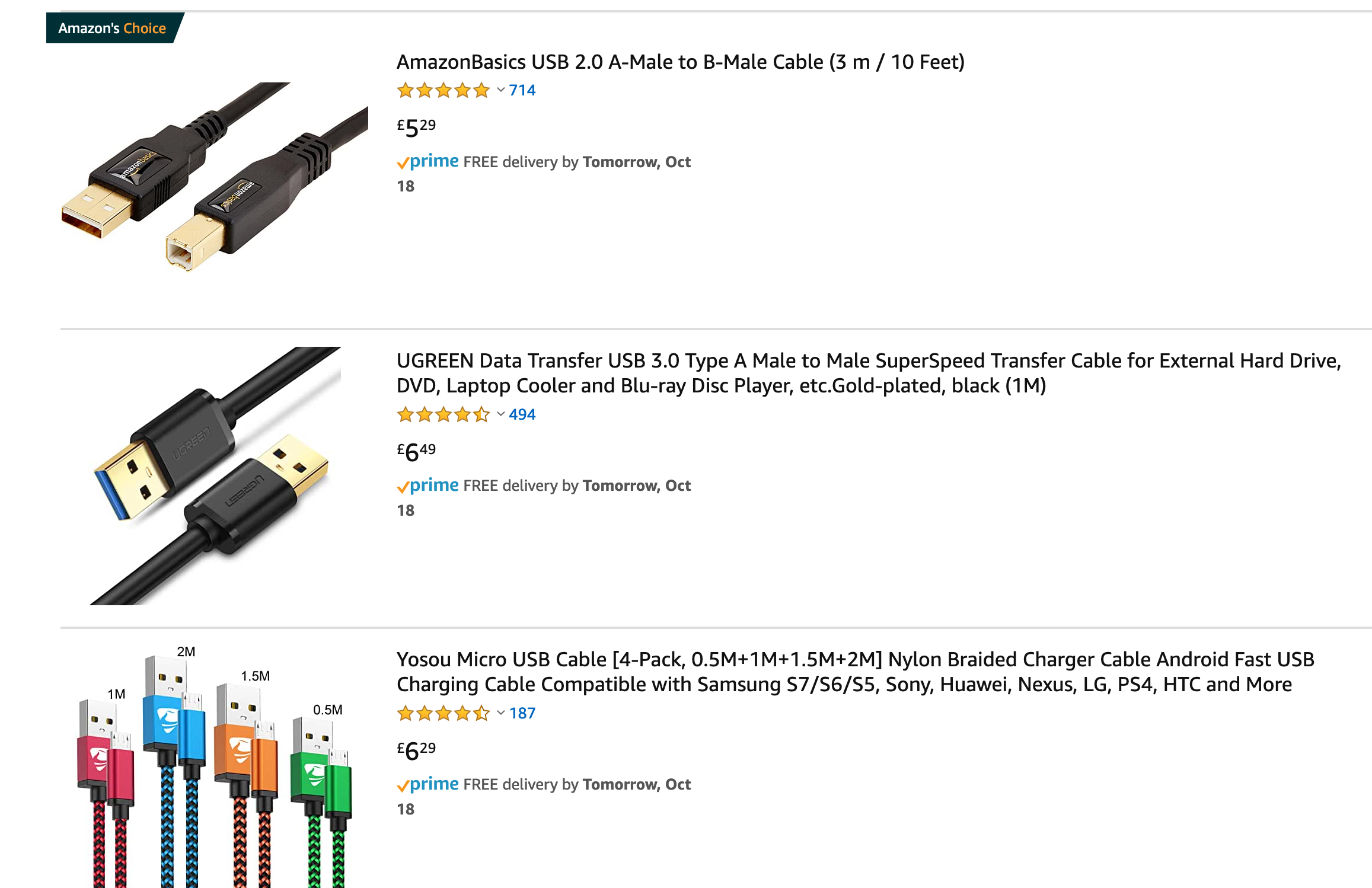 The Amazon Choice is nearly always cheaper…
The Amazon Choice is nearly always cheaper…
They apply this similar principle to how they sell consumer goods on their own site — Amazon is a giant shop where you can buy anything. Third-party sellers have been using it for nearly 20 years now, but are struggling to compete with Amazon’s ridiculously low prices.
So Amazon are making money from all sides, here: by dominating the cloud, and by running their own online shop where people pay them to sell things, and Amazon also sell their own things at much lower prices.
⛏ Breaking up Amazon would likely consist of them dropping AWS — a very unlikely eventuality. The cost to the consumer here is even less obvious: they provide affordable products and help ideas get off the ground with their free AWS credits.
Amazon’s tactics have secured their place in the big four, and if you’re one of the big four, the kinds of products you produce have almost no limitations. Like Google and Facebook, Amazon are planning to establish new internet connectivity infrastructure — which will allow them to dominate a whole new space.
If you're one of the big four, the kinds of products you produce have almost no limitations
Further to this, with Amazon’s money and resources, they are able to invest in technologies such as facial recognition and sell this to both consumers and police departments, creating alarming private surveillance networks.
So in Amazon’s case, the cost to the consumer manifests not as a sheer lack of choice (people like to choose Amazon) but a lack of transparency and control. Ring operates under the guise of enhanced security, but is actually a massive threat to privacy.
😬 The downsides of breaking up Amazon are very likely surrounding consumer monetary cost — if Amazon was broken up and more regulated, it’s products (and other products on Amazon.com) may become more expensive.
Apple
Apple are an interesting player here, because their business does not rely on data, but on hardware. That’s given them an opportunity to seriously set themselves apart when it comes to consumer privacy.
Apple don’t need breaking up, so much as some kind of regulation imposed on their app store. At the moment, Apple themselves set the rules of what makes a ‘good’ app, while creating their own apps themselves. This is like trying playing the game and being the referee at once — it makes no sense.
This app store environment allows Apple to do something similar to Amazon in that it will favour it’s own apps over third-party apps — and Apple takes a 30% cut of any sales if you use their platform.
For instance, many agree that Spotify is better than Apple music. Yet, when you search for ‘music’ in the app store, Apple music comes before Spotify on the list. Spotify even recently named Apple a ‘monopolist’ — I guess it’s hard for them to not see it that way.
🍎 Apple doesn’t need a break-up; just tighter regulation on their app store. This has potential to benefit users massively — people really like iPhones (because they’re good) but every app that Apple spits out isn’t necessarily a winner. Users could get a lot more value out of the app store if access to better, third-party apps was slightly easier.
Breaking up large tech companies has other benefits
The US phone provider AT&T was broken up in 1982 — they controlled the Bell System which provided telephone service to the US and most of Canada. When AT&T jettisoned Bell, it was broken up into nine different companies.
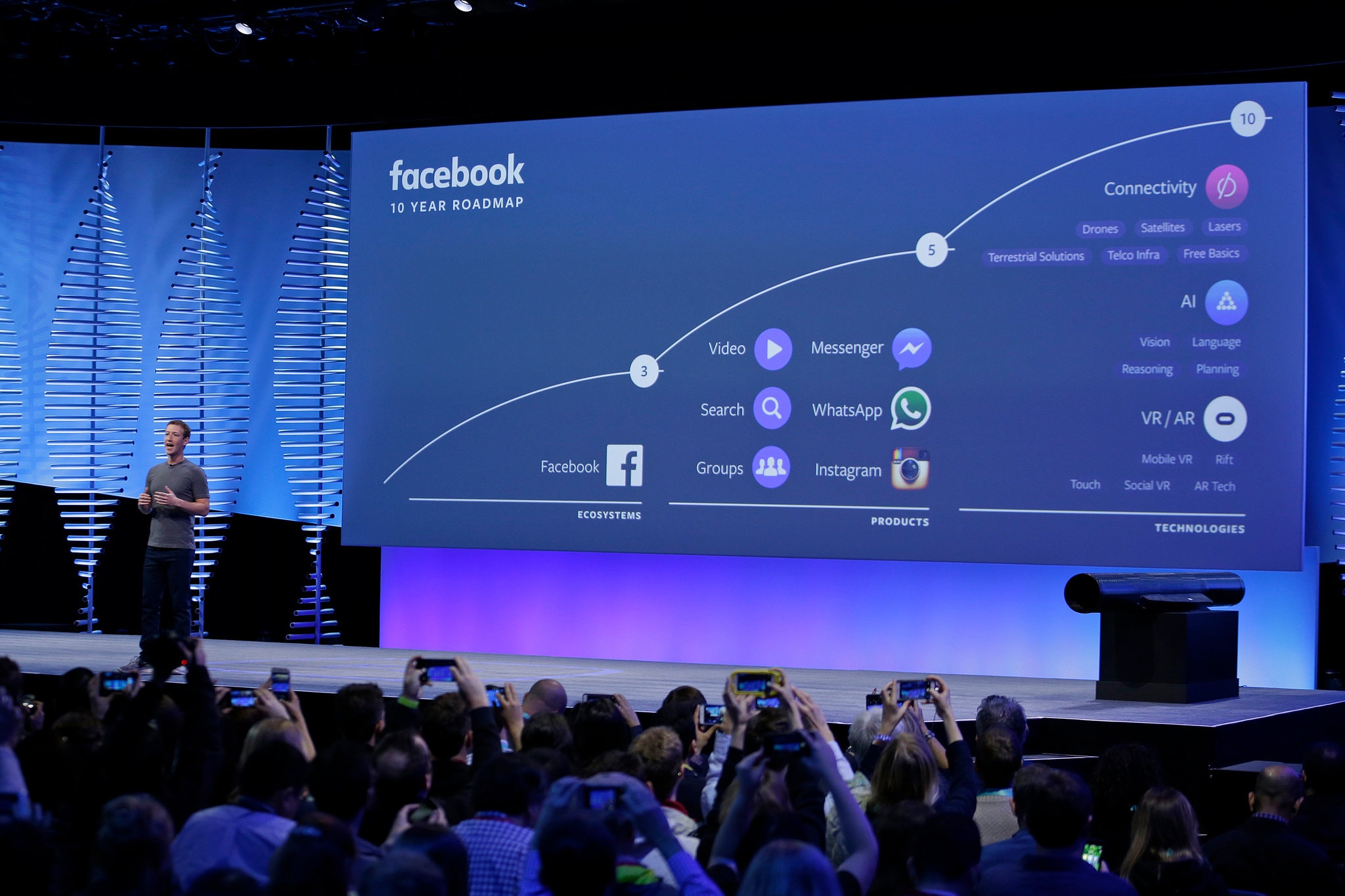 Roadmap of Facebook’s products and technologies.
Roadmap of Facebook’s products and technologies.
Bell Labs was a massive innovator — for decades all they did was invent cool new things like the transistor (you don’t have to know what that is, just know that it was significant) and yes, even mobile phone technology. But all of these patents were owned by AT&T — new technologies were released only on their terms. After the break up, all of that changed and the world was hydrated with innovation.
Once a company has the money and resources, they can build or acquire a lot more new technology — but then it’s completely up to them (and them alone) how it’s used in the world.
We see this happening all the time: Facebook recently acquired tech to allow us to control computers with our brains; Google developed TensorFlow, an AI framework that inadvertently gave birth to deepfakes; Amazon have developed and maintained facial recognition software, with applications that are a privacy nightmare. The list goes on.
To conclude, it’s hard to say if the benefits of breaking up big tech outweigh the costs — but what we do know is that the cost to the consumer at the moment is pretty high. With many users concentrated in a small number of platforms, and fantastic levels of innovation being hoarded by only four companies, the balance is certainly tipped towards only a small number of players — it’s time for some recalibration.
